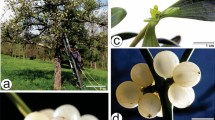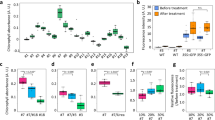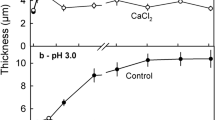Abstract
FOR many years plant anatomists have used macerating techniques1–3 which subject plant-tissues to either destructive oxidizing agents (usually chromic acid), concentrated acid or alkali, or high temperature. These procedures can cause change in volume of the cells. Macerating media containing chromic acid have been found to destroy cell-walls3 and the other media referred to above would also be very damaging to plant-cells.
This is a preview of subscription content, access via your institution
Access options
Subscribe to this journal
Receive 51 print issues and online access
$199.00 per year
only $3.90 per issue
Buy this article
- Purchase on Springer Link
- Instant access to full article PDF
Prices may be subject to local taxes which are calculated during checkout
Similar content being viewed by others
References
Tupper-Carey, R. M., and Priestley, J. H., Proc. Roy. Soc., B, 95, 109 (1924).
McLean, R. C., and Cook, W. R. I., “Plant Science Formulæ”, 85 (Macmillan, London, 1941).
Brown, R., and Rickless, P., Proc. Roy. Soc., B, 136, 110 (1949).
Author information
Authors and Affiliations
Rights and permissions
About this article
Cite this article
LETHAM, D. Maceration of Plant-tissues with Ethylene-diamine-tetra-acetic Acid. Nature 181, 135–136 (1958). https://doi.org/10.1038/181135a0
Issue Date:
DOI: https://doi.org/10.1038/181135a0
This article is cited by
-
Participation of ions in promoting intermolecular associations of cell wall polysaccharides
Structural Chemistry (2009)
Comments
By submitting a comment you agree to abide by our Terms and Community Guidelines. If you find something abusive or that does not comply with our terms or guidelines please flag it as inappropriate.



